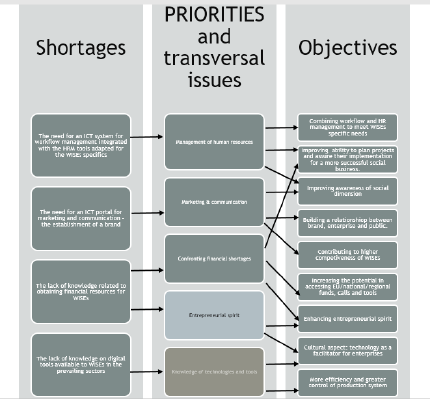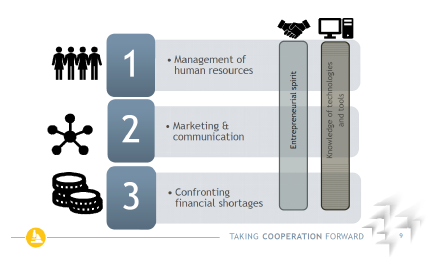End of the first work package
The first work package within the project Technologies, Competences and Social Innovation for Work Integration Social Enterprises – INNO WISEs has come to an end. The activities and objectives of the first Work Package – entitled Context Analysis Increasing Knowledge on WISEs Skills Shortages in the Central Europe area, have been successfully accomplished.
With the efforts of all project partners and stakeholders from all participating regions, School of Advanced Social Studies from Nova Gorica - SASS as the leader of the first Work Package, prepared the final Output - Regional Joint Strategy to tackle WISEs technologic and management skills shortages in the long-run.
The strategy has defined the three joint strategic priorities, relevant for all regions included in the INNO-WISEs project, namely: (1) management of human resources; (2) marketing and communication; (3) confronting financial shortages.
These three joint priorities overlap with the two joint transversal issues, also clearly identified through the shortages and addressed through the objectives. They include: (1) strengthening of the entrepreneurial spirit of WISEs, both internally, among their management and employees and also externally – to co-create a general atmosphere supporting the idea that entrepreneurship can be at the same time committed both to the ideals of social solidarity and to market performance; (2) improving the WISEs knowledge of the available technologies, tools and related skills, to be able not only to follow but also to be engaged in the cutting age trends of applying ICT based tools and technologies in their operations; WISEs should be familiar with the tools that are already available to them, be able to decide, in which tools they should invest and be able to exploit them optimally.
As the targets of the INNO-WISEs project actions based on these joint strategic priorities and objectives, the strategy has identified: (1) focusing on micro and small size WISEs because they are typically less competitive, lack more skills and technologies, when compared to the bigger WISEs, and also because they are the most common WISEs type in some of the regions; (2) targeting the managerial and operational level, as they are those (especially in small and micro-sized WISEs) who guide the WISEs in the strategic decision making and in the every-day decision.
Regarding the implementation, Priority 1 and Priority 2 can be addressed: (1) either through the work with the existing ICT tools in terms of existing applications (for human resource management combined with workflow management) and/or ICT supported networks: (2) or through the development of new ICT solutions: (a) a new application adapted for WISEs specific needs and combining human resource management with workflow management and/or (b) a new web-portal connecting WISEs with their internal and external stakeholders, enabling them to present their stories, build their brands and raise social awareness among the general public; (3) in any case, open source solutions shall be provided.
Joint strategic priorities as derived from the commonly identified shortages and linked to the joint strategic objectives

Beside the Regional Joint Strategy and in relation to the INNO-WISEs project, scholars from the Institute of Social Sciences Ivo Pilar (Croatia) and School of Advanced Social Studies (Slovenia) also published a scientific article under the title " Performance of work integration social enterprises in Croatia, Slovenia, and Italian Regions of Lombardy and Trentino" which you can consult by klicking bellow.

